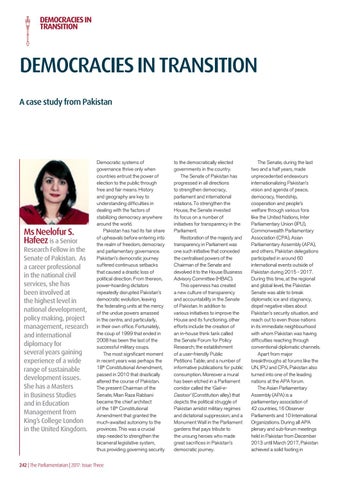DEMOCRACIES IN TRANSITION
DEMOCRACIES IN TRANSITION A case study from Pakistan
Ms Neelofur S. Hafeez is a Senior
Research Fellow in the Senate of Pakistan. As a career professional in the national civil services, she has been involved at the highest level in national development, policy making, project management, research and international diplomacy for several years gaining experience of a wide range of sustainable development issues. She has a Masters in Business Studies and in Education Management from King’s College London in the United Kingdom.
Democratic systems of governance thrive only when countries entrust the power of election to the public through free and fair means. History and geography are key to understanding difficulties in dealing with the factors of stabilizing democracy anywhere around the world. Pakistan has had its fair share of upheavals before entering into the realm of freedom, democracy and parliamentary governance. Pakistan’s democratic journey suffered continuous setbacks that caused a drastic loss of political direction. From thereon, power-hoarding dictators repeatedly disrupted Pakistan’s democratic evolution, leaving the federating units at the mercy of the undue powers amassed in the centre, and particularly, in their own office. Fortunately, the coup of 1999 that ended in 2008 has been the last of the successful military coups. The most significant moment in recent years was perhaps the 18th Constitutional Amendment, passed in 2010 that drastically altered the course of Pakistan. The present Chairman of the Senate, Mian Raza Rabbani became the chief architect of the 18th Constitutional Amendment that granted the much-awaited autonomy to the provinces. This was a crucial step needed to strengthen the bicameral legislative system, thus providing governing security
242 | The Parliamentarian | 2017: Issue Three
to the democratically elected governments in the country. The Senate of Pakistan has progressed in all directions to strengthen democracy, parliament and international relations. To strengthen the House, the Senate invested its focus on a number of initiatives for transparency in the Parliament. Restoration of the majesty and transparency in Parliament was one such initiative that conceded the centralised powers of the Chairman of the Senate and devolved it to the House Business Advisory Committee (HBAC). This openness has created a new culture of transparency and accountability in the Senate of Pakistan. In addition to various initiatives to improve the House and its functioning, other efforts include the creation of an in-house think tank called the Senate Forum for Policy Research; the establishment of a user-friendly Public Petitions Table; and a number of informative publications for public consumption. Moreover a mural has been etched in a Parliament corridor called the ‘Gali-eDastoor’ (Constitution alley) that depicts the political struggle of Pakistan amidst military regimes and dictatorial suppression; and a Monument Wall in the Parliament gardens that pays tribute to the unsung heroes who made great sacrifices in Pakistan’s democratic journey.
The Senate, during the last two and a half years, made unprecedented endeavours internationalizing Pakistan’s vision and agenda of peace, democracy, friendship, cooperation and people’s welfare through various fora like the United Nations, Inter Parliamentary Union (IPU), Commonwealth Parliamentary Association (CPA), Asian Parliamentary Assembly (APA), and others. Pakistan delegations participated in around 60 international events outside of Pakistan during 2015 - 2017. During this time, at the regional and global level, the Pakistan Senate was able to break diplomatic ice and stagnancy, dispel negative vibes about Pakistan’s security situation, and reach out to even those nations in its immediate neighbourhood with whom Pakistan was having difficulties reaching through conventional diplomatic channels. Apart from major breakthroughs at forums like the UN, IPU and CPA, Pakistan also turned into one of the leading nations at the APA forum. The Asian Parliamentary Assembly (APA) is a parliamentary association of 42 countries, 16 Observer Parliaments and 10 International Organizations. During all APA plenary and sub-forum meetings held in Pakistan from December 2013 until March 2017, Pakistan achieved a solid footing in
